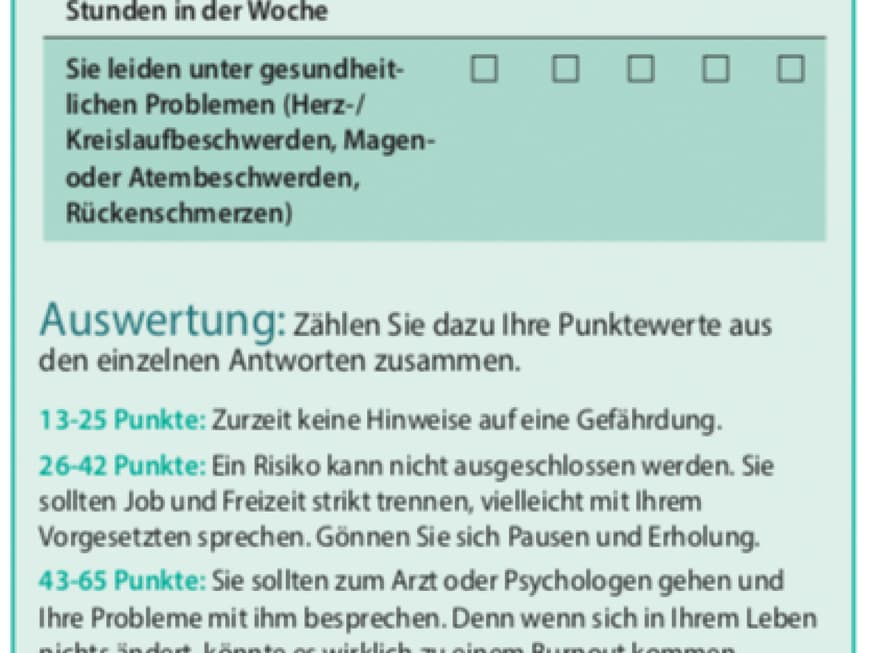
Stress is actually a positive thing: it ensures that we are strong and efficient, it makes us alert and fast. In the Stone Age, this was useful for escaping the enemy or hunting game. Afterwards, the body reduced the level of stress hormones again. Today, on the other hand, the level remains high and we are exposed to constant stress. Because the maxim of the meritocracy is still: higher, faster, further - more!

However, around one in two employees in Germany feels exhausted by this "more". If this happens frequently or becomes a permanent condition, the body reacts. It switches off, programming itself back to factory settings, so to speak. Doctors then diagnose these symptoms as "burnout". Burnt out due to too much demand, too little relaxation. Burnout forces people to seriously rethink their lifestyle habits in a radical way and possibly to completely reorganize them.
Burnout also occurs when people are underchallenged
Burnout is not actually a disease in its own right, but a so-called risk condition. This means that it can develop into depression or an anxiety disorder. People who always want to be perfect are particularly at risk. Incidentally, burnout can also occur if you feel underchallenged and unappreciated at work. This is also referred to as "boreout".
The first signs are sleep disorders
But it doesn't have to get that far. Our body shows us when it can no longer cope. We just have to listen to it very carefully. Unfortunately, the alarm signals are often overlooked. People between the ages of 30 and 50 are particularly affected - an age at which we are in the middle of life; an age at which we have a career and a family to look after at the same time. The first signs of burnout are chronic fatigue, irritability or a tendency to aggressive behavior, mood swings and even depressive moods. In addition, increasing impatience and anger at oneself, the feeling of being controlled by others and only being able to function in everyday life. Added to this are problems falling asleep and staying asleep - which leads to even more tiredness. Alarm bells should ring for anyone who sleeps particularly badly on the night from Sunday to Monday.
Burnout prevention: exercise reduces stress hormones
To prevent burnout, the experts strongly advise you to reduce your stress levels! To reduce the levels of the hormones cortisol, adrenaline and noradrenaline, you should work out. Exercise reduces these hormones. Three 30-minute sessions of exercise per week are recommended. This may sound strenuous for some people, but it's not really, as a brisk walk will do the trick. However, you should work up a sweat. A power walk like this also clears your head.
You have to take time for yourself
Also really important: work and leisure time must be kept strictly separate. No more work emails after work, no more being constantly available, no more solving problems in your free time. Instead, you should find out what you like to do and then do it consistently. This could be a visit to a museum, an evening at the movies with friends, reading a crime novel - or simply lying on the sofa for an hour and gazing into the air. The intention behind it: You should take time for yourself - without a guilty conscience. Sometimes, however, you have to get professional help. If you don't feel well for a long time, it's better to see a doctor. They can prescribe therapy.
Quick tips to combat a low mood
The gentle power of nature can quickly and effectively alleviate anxiety and sleep disorders. These plants calm and relieve nervousness:
Lavender The scent of true lavender (Lavandula angustifolia) helps to calm the mind, relieves anxiety and eases insomnia. Simply place a bowl of the flowers next to your pillow. Lavender also helps internally: preparations containing the oil of the plant are used to treat inner restlessness and depressive moods.
Angelica It is also called anxiety root - the name says it all. To make a tea, boil a teaspoon of dried root with 1 cup of cold water and leave to infuse for 10 minutes. This calms and gives strength.
St. John's wort This yellow flowering herb is known as the "arnica of the nerves". It helps with stress and nervousness. If necessary, drink a cup of tea three times a day.
You can find help here:
www.burnout-syndrom-hilfe.eu website with lots of information and tips, run on a voluntary basis by qualified psychologists.
www.burnout-fachberatung.de Seminars and coaching to prevent and treat burnout. Help with reintegration into the job.
www.burn-out-forum.de Extensive forum for exchanging information and answering questions, plus discussion with those affected.
www.hilfe-bei-burnout.de First point of contact for patients and






